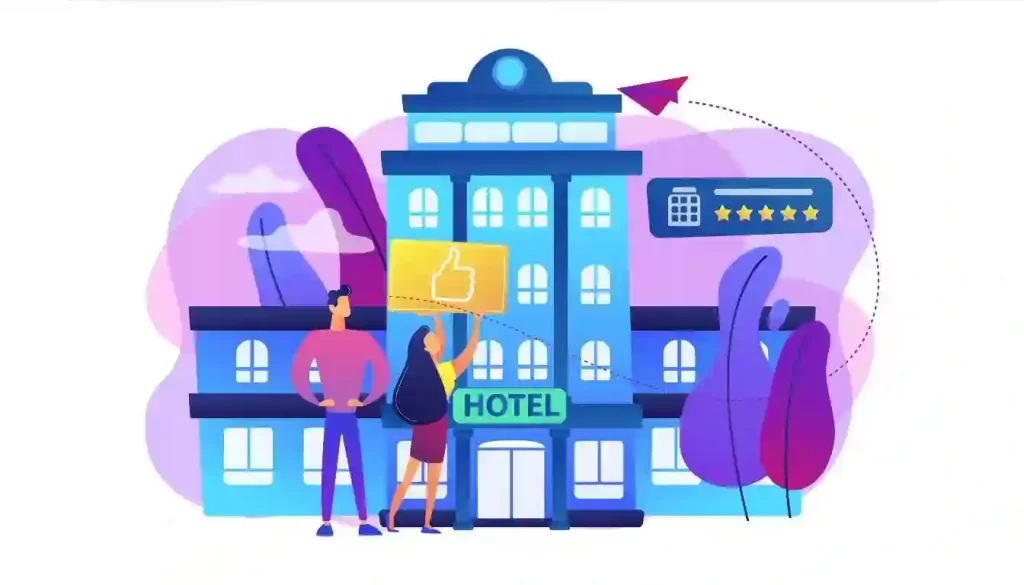Reputation management is the name of the game when it comes to hospitality success. This article looks at proactive strategies of reputation that benefit hotels by reinforcing guest retention and bookings to optimal levels. Discover actionable techniques, tools, and case studies that showcase the power of maintaining a positive online presence for long-term success.
In the hospitality industry, a reputation is everything. In other words, hotel businesses need to balance meeting the expectations of their guests with the task of engendering trust and loyalty. In the virtual world, online reviews and customer feedback have emerged as crucial ways to shape public perception of brands. From influencing repeat-guest percentages to driving decisions of where to book, effective reputation management can mean the difference between thriving and merely surviving.
The importance of reputation management in hospitality
Reputation in the hospitality industry is the backbone of success, influencing customers’ trust, loyalty, and brand perception. This has become very critical with the rise of digital platforms, where travelers are increasingly influenced by online reviews, ratings, and social media to make decisions on their stay, dining, and service options.
Key reasons Why reputation management matters
- Builds trust and credibility
A good reputation ascertains trust and more importantly, allows prospective customers to trust your business over others. It’s paramount in a competitive market when people tend to trust brand names more than some hidden or unheard-of business shops. - Drives revenue growth
High ratings and positive reviews have a direct influence on revenues. According to studies, an increase in a hotel’s online rating by one star leads to significant revenue growth, as potential customers perceive the higher-rated ones as more reliable and desirable. - Improves customer retention
Effective reputation management focuses on acting upon guest feedback to assure customer satisfaction and loyalty. Loyal customers not only return but also become the brand’s ambassadors, sharing their positive experiences with their network. - Mitigates negative publicity
Proactively managing reputation helps address negative reviews or complaints swiftly, preventing them from escalating into larger issues. Responding to criticism with empathy and professionalism can even turn dissatisfied customers into loyal patrons.
- Improves online visibility
Platforms like TripAdvisor, Google, and Yelp play a significant role in how a business appears online. Positive reviews and active engagement boost search engine rankings, making businesses more discoverable to potential customers.
- Supports competitive advantage
A strong reputation differentiates businesses in a crowded market. When potential customers are deciding between similar options, the establishment with better reviews and a stronger reputation often wins.
Best practices for reputation management
- Monitor online platforms: Use tools to track mentions, reviews, and social media discussions about your business.
- Engage with customers: Respond promptly and professionally to feedback, both positive and negative.
- Deliver consistent quality: Exceed guest expectations consistently to encourage positive reviews.
- Leverage social media: Share success stories, respond to inquiries, and actively engage with followers.
- Train staff: Equip employees with skills to provide exceptional service, ensuring guest satisfaction.
By prioritizing reputation management, hospitality businesses can build trust, attract more customers, and maintain a competitive edge in a dynamic and digital-first marketplace.
Why online reviews matter for hotel bookings
Online reviews shape travelers’ decisions. Studies show that:
- 72% of guests won’t book a hotel with poor reviews.
- Positive reviews boost conversion rates by as much as 25%.
Travelers often consult platforms like TripAdvisor, Google Reviews, and Yelp before making bookings, valuing the opinions of fellow guests over traditional marketing messages.
The role of reputation management in guest retention
Guest retention depends on trust and satisfaction. Hotels that proactively address feedback foster loyalty.
- Example: A small hotel chain implemented a review monitoring system, reducing complaints by 35% and increasing repeat bookings.
Impact of customer feedback on business success
Customer feedback provides actionable insights. For instance:
- Analyzing negative reviews can identify recurring issues (e.g., slow check-in processes).
- Resolving these issues enhances guest experience and boosts reputation.
Strategies for managing hotel reviews and ratings in hospitality
Effectively managing hotel reviews and ratings is essential for maintaining a positive reputation and attracting new guests. Here’s how hotels can implement successful strategies:
- Monitor review platforms regularly: Use tools or dedicated resources to track guest feedback on platforms like TripAdvisor, Google, and social media. Staying aware of what’s being said helps hotels respond promptly to reviews.
- Respond to reviews promptly: Address both positive and negative reviews with professionalism and empathy. Thank guests for their feedback and provide thoughtful solutions to any issues they encountered.
- Encourage guest feedback: Actively request reviews from satisfied guests. Provide incentives like discounts on future stays or complimentary services for those who leave reviews.
- Deliver exceptional service: Consistently exceed guest expectations to naturally encourage glowing reviews. Train staff to focus on creating memorable guest experiences.
- Leverage positive reviews in marketing: Share favorable reviews on the hotel’s website, social media, and promotional materials. Highlighting guest satisfaction builds trust and attracts potential customers.
- Analyze feedback for improvements: Use review data to identify trends, such as frequently mentioned issues or standout amenities. Implement changes based on this feedback to enhance the guest experience.
- Manage negative reviews proactively: Apologize sincerely to dissatisfied guests and outline steps to address their concerns. A well-handled negative review can demonstrate the hotel’s commitment to guest satisfaction.
By applying these strategies, hotels can turn reviews into valuable tools for building trust, improving services, and boosting online visibility.
Proactive review management techniques
- Monitor regularly: Use tools like Revinate or TrustYou to track reviews in real time.
- Respond promptly: Address concerns within 24 hours to show attentiveness.
- Encourage positive reviews: Offer incentives like discounts for guests who leave honest feedback.
Leveraging social media for reputation improvement
Social media platforms like Instagram and Facebook play a vital role in shaping perceptions.
- Showcase real-time guest experiences through photos or testimonials.
- Engage directly with guests by replying to comments and messages.
Case studies: Reputation management in hospitality
- Luxury Resort: By implementing a personalized email campaign post-stay, a resort increased its 5-star reviews by 40%.
- Boutique Hotel: Leveraged Instagram Stories to promote positive guest experiences, leading to a 15% rise in bookings.
The benefits of proactive reputation management
Proactive reputation management is vital for businesses looking to maintain trust, attract customers, and achieve long-term success. Here’s why taking a proactive approach matters:
- Builds trust and credibility: Consistently managing and enhancing your reputation ensures customers see your brand as trustworthy, increasing loyalty and word-of-mouth referrals.
- Improves customer retention: Addressing feedback and concerns early fosters stronger customer relationships, encouraging repeat business and long-term partnerships.
- Enhances online visibility: Actively engaging with reviews and creating positive content improves search engine rankings, making your business more discoverable to potential customers.
- Prevents negative PR escalation: Identifying and resolving issues before they spiral minimizes the impact of negative press or dissatisfied customer feedback on your brand image.
- Supports competitive advantage: A well-managed reputation sets you apart in crowded markets, appealing to customers seeking reliable and reputable brands.
- Boosts revenue potential: Businesses with strong reputations often command higher prices and experience increased sales, as consumers prioritize trusted providers.
By investing in proactive reputation management strategies like regular monitoring, swift responses, and transparent communication, businesses can cultivate a positive public image that drives growth and resilience.
Booking optimization and revenue growth
A strong online reputation directly correlates with increased bookings and revenue.
- Hotels with a 4.5-star rating enjoy 20% higher booking rates than those with lower ratings.
Positive brand image and customer trust
Building a trustworthy image encourages repeat customers and referrals. This includes:
- Delivering consistent service quality.
- Highlighting guest testimonials on marketing materials.
Tools for reputation enhancement
Several platforms assist in streamlining reputation management:
- Review trackers: Simplifies review monitoring.
- Hootsuite: Schedules and monitors social media engagement.
- Trip advisor insights: Analyzes guest trends for actionable improvements.
Challenges and solutions in hospitality reputation management
Identifying obstacles helps hotels create robust solutions for reputation improvement.
Common challenges
- Negative reviews: This can deter potential guests if left unaddressed.
- Fake reviews: Damage credibility and skew guest perceptions.
- Time constraints: Monitoring every review across multiple platforms is time-consuming.
Solutions and best practices
- Implement AI tools: Automate review tracking and analysis using AI-driven software like Medallia.
- Train staff: Ensure teams understand the importance of guest interactions.
- Counter fake reviews: Actively report fraudulent content on platforms like Yelp and Google.
Practical applications of reputation management in hospitality
Applying strategies effectively ensures lasting results.
Steps to improve online reputation
- Engage guests post-stay: Send personalized emails requesting feedback.
- Showcase positive experiences: Highlight guest testimonials on your website and social media.
- Offer real-time support: Resolve issues swiftly via chatbots or live customer service.
Real-world examples
- Eco-resort: Resolved recurring complaints about cleanliness through operational changes, earning consistent 5-star ratings.
- Family-owned hotel: Partnered with local influencers, increasing their social media mentions by 25%.
Reputation management tools for small hotel chains
Choosing the right tools can simplify reputation management processes.
Comparison of popular tools
| Tool | Features | Best For |
|---|---|---|
| Revinate | Review monitoring and surveys | Mid-sized chains |
| Birdeye | Guest feedback and analysis | Budget-friendly |
| TrustYou | Advanced sentiment analysis | Large establishments |
How to maximize tool efficiency
- Centralize data: Consolidate reviews from platforms like Google, Booking.com, and Yelp.
- Automate responses: Use pre-set templates for common queries or complaints.
Advanced techniques and future outlook
Innovative strategies and trends pave the way for reputation management evolution.
Forward-thinking strategies
- Personalized experiences: Leverage AI to customize guest interactions.
- Predictive analysis: Use data to anticipate guest needs and tailor services accordingly.
Trends in reputation management
- Growth in video testimonials as a preferred review format.
- Increasing reliance on Augmented Reality (AR) for showcasing hotel features virtually.
Conclusion
Reputation management is a cornerstone of success in the hospitality industry. By proactively addressing guest feedback, leveraging modern tools, and implementing innovative strategies, hotels can build trust, optimize bookings, and foster long-term loyalty. As the industry evolves, staying ahead of trends and technologies will ensure sustained growth and success.
FAQs and Additional Resources
- Why is reputation management critical for hotels?
It influences bookings, fosters guest loyalty, and impacts revenue. - What are the best tools for small hotels?
Tools like Birdeye and ReviewTrackers are cost-effective and user-friendly. - How can social media improve the hotel’s reputation?
Engaging with guests through photos, testimonials, and comments builds trust and attracts new customers.
For further learning, explore:
- TripAdvisor Insights
- Google Business Reviews Best Practices




